A tough climb: From mountaineer to tour operator
- Published
Hassan Sadpara spoke to the BBC in 2014
"Convert dreams into reality" says the visiting card of the man sitting behind the cash counter in his small shop in Skardu bazaar, Pakistan.
The card has four small pictures of him posing on top of snow-peaked mountains.
"National hero Hassan Sadpara: first Pakistani to climb all five peaks above 8,000 metres, plus Everest," reads the card.
For a man with humble beginnings, Hassan is indeed a hero for what he has achieved in his mountaineering career.
But when it comes to business, his dreams haven't really materialised.
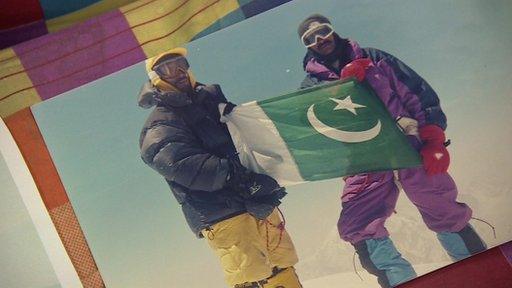
Hassan Sadpara was the first Pakistani to climb all five peaks above 8,000 metres
A tour company he opened a few years ago went bust. And the earnings from his shop, packed with used and new mountain gear imported from Nepal and China, just about help him stay afloat.
"See this merchandise," he says pointing to rows of colourful backpacks, clothes and shoes. "I have about $10,000 (£6,000) worth of goods here, but hardly any buyers," he says.
It wasn't always like this though.
When he first set up this shop, in 1999, north Pakistan was still a reasonably charming tourist destination.
Adventurists from all over the world came to explore Baltistan, which has Tibetan heritage and borders the Chinese province of Xinjiang and Indian-administered Kashmir.
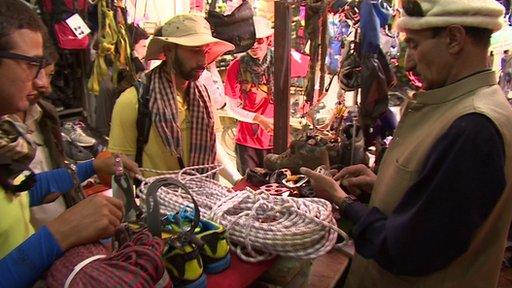
Hassan's shop sells moutain gear to climbers
Some would arrive in the regional capital, Skardu, on a short scenic flight over the great mountain peaks from Islamabad.
Others would take the longer but more adventurous road journey, driving along the legendary Karakoram Highway, with the mighty River Indus gushing several hundred metres below.
Those were the days, recalls Hassan. His mountaineering career was taking off and, thanks to foreign tourists, his business was thriving.
Then the 9/11 terrorist attacks on the World Trade Center in New York happened.
Over the next decade or so, Pakistan witnessed relentless violence as well as the spread of militancy. Tens of thousands of lives were lost, mostly Pakistanis but foreigners were among the victims too.
As a result Western tourists disappeared. The country's image became its biggest obstacle in reviving any sort of tourism.
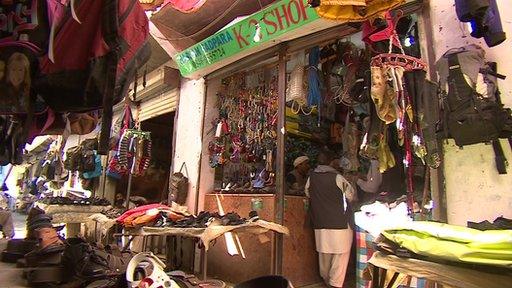
A lack of tourists mean there are fewer customers for Hassan's shop
"No tourists, means no business. It's that simple," says Hassan. It affects the local economy, including porters, cooks, guides, drivers, hoteliers and others whose livelihood depends on foreign visitors.
"There are hardly any factories or jobs here," points out Hassan. "But what we have is a lot of natural beauty, friendly people and a unique landscape."
The Baltistan region is home to the world's second highest peak, K2, or "Chogori" as the locals call it in Balti, meaning "King of Mountains". It has several breathtaking valleys, lakes, and of course, the Deosai Plains - the second highest plateau in the world, after the adjoining Tibetan Plateau.
To boost his fortunes, Hassan set up a tour operator firm in partnership with a family friend a few years ago. The idea was to encourage tourism, offer a wide range of services to foreign visitors and make some money in the process.
Hassan invested his savings and left it to his partner to manage the business.
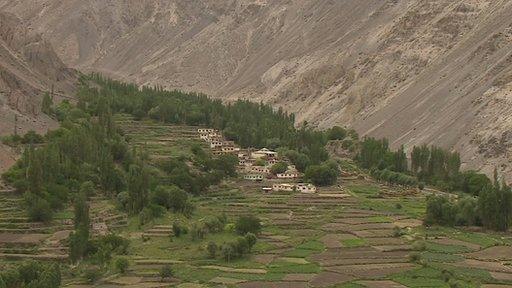
The Baltistan region has several beautiful valleys and lakes
But there was a problem - his partner ran a separate business of his own and couldn't pay much attention to the new firm. Sure enough, the company failed to take off. Hassan lost his money and the firm went out of business.
Reflecting on the failed venture, Hassan doesn't really hold his business partner responsible. He blames it on his own lack of education.
"I have climbed some of the world's toughest mountains. But I never learned how to read and write," he says. "That's been my biggest impediment."
Hassan was born into a poor family in the village of Sadpara, a 20-minute drive from Skardu.
Nestled amid towering peaks near the Sadpara Lake, the village has produced some of Pakistan's leading high-altitude porters and mountaineers.
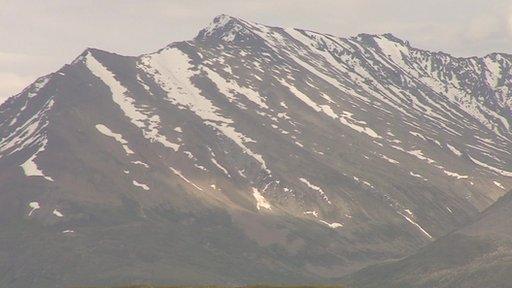
There are still not enough schools in Baltistan
"When I was growing up, we didn't have a school," he says. When the village finally got a school, there was no teacher. Later, he recalls, a teacher from Skardu would walk up for two hours to come to his village. He would offer lessons for a couple of hours and then spend another two hours going back to town.
By then, Hassan was busy helping his family working as a farmer and a shepherd. Education was seen as a luxury they couldn't afford.
Today, there are certainly more schools in Baltistan, but still not enough. In places that the government can't reach, charities - led by local communities and funded by diaspora - are trying to plug the gap.
Hassan was invited to give a talk at one such school in his village, run by a local charity called "Inspire -for the love of mountains".
"My biggest regret in life is that I am illiterate," he tells the boys and girls assembled in the small courtyard before him. "With education, the sky is the limit for you."
Returning to his shop, Hassan says that after years of struggling, he is once again thinking of getting back into the tour operator business.
How will it be different this time? I ask.
"Well, for one, I won't go into a partnership," he says with a smile. "This time, I have my son who is ready to help me."
It is a proud moment for a man who never went to school, but made sure he put his oldest son through college.
His son Arif is currently pursuing an MBA degree in Islamabad and is really excited about the project.
He says he wants to make the most of his father's goodwill and experience, earned over decades of dealing with visitors.
Arif has already got the new company's name in mind. "I am going to call it 'Hassan Sadpara Track and Tours'," he says. Over the next few months, he plans to set up a website to start promoting the new company.
With his educated son by his side, this time Hassan certainly seems more hopeful of turning his dream into a reality.